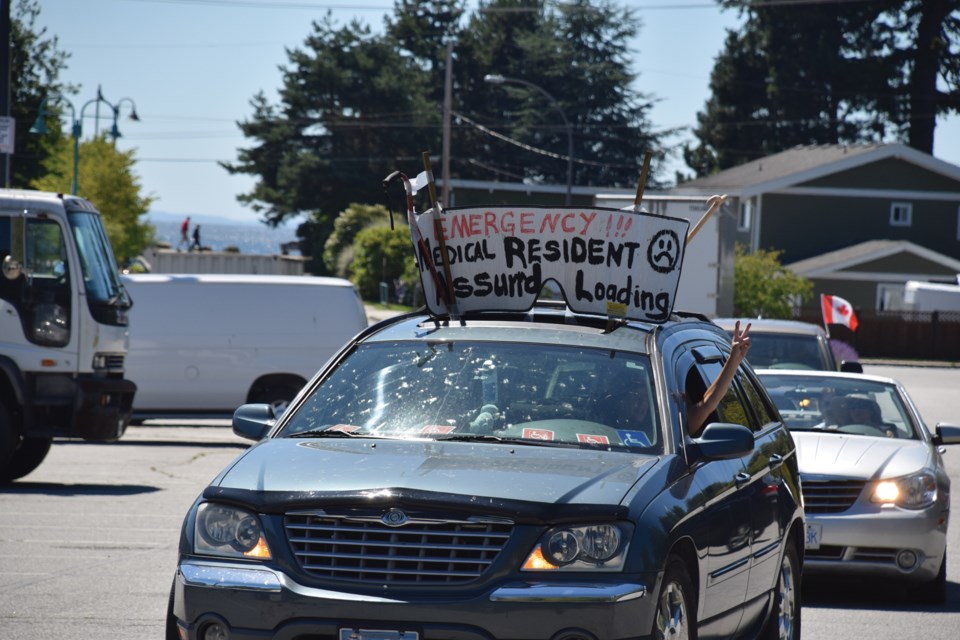The province has ended resident priority boarding on BC Ferries but directed the company to “implement all procedures necessary” to give priority loading to passengers travelling for documented medical reasons.
Minister of Public Safety and Solicitor General Mike Farnworth on July 30 changed the ministerial order that directed BC Ferries to give priority to residents and essential goods and services during the COVID-19 state of emergency.
The original wording in Ministerial Order 84 (MO84), first issued in March, was that BC Ferries “must implement all procedures necessary to ensure priority loading on ferries for the following: vehicles carrying essential goods and supplies; residents of ferry sailing destinations.” There was no mention of travel for medical purposes.
Farnworth confirmed in a media release that the revised order removes the requirement to give priority access for passengers sailing to their primary residence.
“Residents of ferry sailing destinations” was removed from MO84, and an additional order, MO256, was issued directing BC Ferries to “implement all procedures necessary to ensure that an individual who arrives at a terminal at least 30 minutes before a ferry is scheduled to sail is loaded on the ferry, along with any vehicle in or on which the individual arrives and any other individual travelling in or on that vehicle, if the individual is travelling to or from medical treatment.”
Under the new order, travellers will have to present a “letter, dated and signed by a medical practitioner, stating that the individual requires priority loading” and “a completed Travel Assistance Program (TAP) form.”
According to the ministry, the doctor’s letter does not need to specify a date, time, or number of occasions the person travelling will require medical-assured loading, “but may specify a period of time of up to one year from the date of the letter.”
“These new provisions will ensure that medical-assured loading is protected for people travelling by ferry for medical treatment,” Farnworth said in the release. “BC Ferries will also continue to give priority to vehicles carrying essential goods and supplies, and will need to consult the Province before changing or varying minimum ferry service levels,”
Both Powell River-Sunshine Coast MLA Nicholas Simons and BC Ferries CEO Mark Collins had approached the province calling for an end to resident priority.
Simons told Coast Reporter after Thursday’s announcement that “if Ferries is unable to properly administer resident priority,” he’s happy to see it end, for now at least, and a new order prioritizing medical travel put in place.
“I’ve heard from too many constituents, and advocates for constituents, that they’re unable to attend their doctor,” Simons said. “This is a time when a lot of rescheduled appointments are taking place [and] access to your medical professional is essential.”
Simons said he would have preferred a system that requires only a TAP form to prove someone is travelling for medical purposes and plans to follow up on whether the procedure can be further simplified.
Southern Sunshine Coast Ferry Advisory Committee (FAC) chair Diana Mumford said the removal of the resident priority clause from the order was understandable because it had “become much more burdensome” as traffic continues to increase and “has not been without significant negative impacts for many.”
Mumford also said in an email to Coast Reporter that the procedure outlined by the province for getting priority under the new order is not significantly different from the existing medical-assured loading rules, although it does allow a doctor’s letter to be valid for a year.
Mumford said the FAC has been working with BC Ferries and the Ministry of Health to get an easier process in place.
“We have had residents and physicians that do not know the detailed process, so patients have not been able to get the required documentation when needed,” she said. “There are also residents who have not been able to get this documentation that still try to have assistance at the terminal and are not accommodated on the next sailing for a number of reasons. They are then left to sit in line-ups for hours after having significant surgeries [or] procedures.”
BC Ferries said it would implement the new and revised orders as of July 31.



